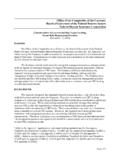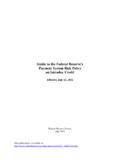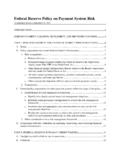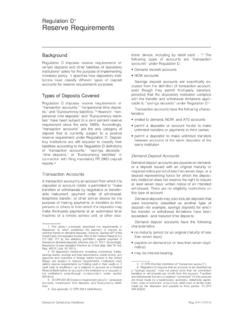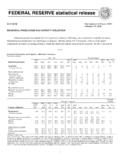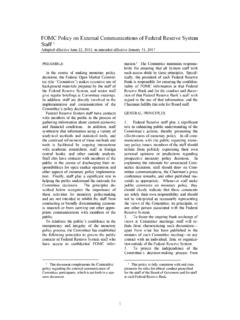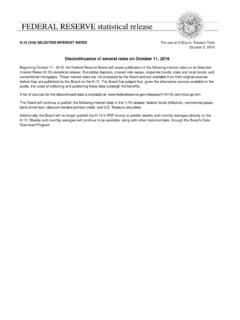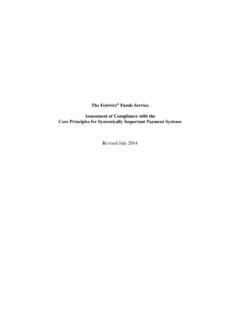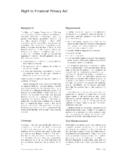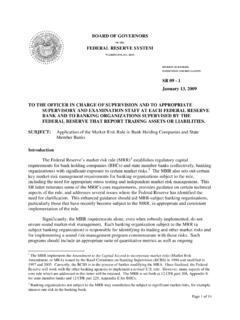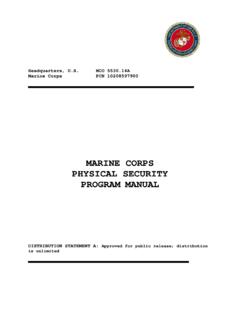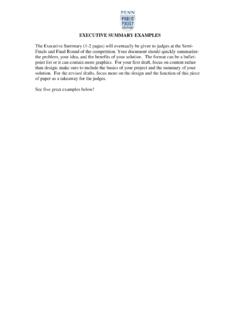Transcription of Why Do We Think That Inflation Expectations Matter for ...
1 Finance and Economics Discussion SeriesDivisions of Research & Statistics and Monetary AffairsFederal Reserve Board, Washington, Do We Think That Inflation Expectations Matter forInflation? (And Should We?)Jeremy B. Rudd2021-062 Please cite this paper as:Rudd, Jeremy B. (2021). Why Do We Think That Inflation Expectations Mat-ter for Inflation ?(And Should We?), Finance and Economics Discussion Se-ries :Board of Governors of the Federal Reserve System, : Staff working papers in the Finance and Economics Discussion Series (FEDS) are preliminarymaterials circulated to stimulate discussion and critical comment. The analysis and conclusions set forthare those of the authors and do not indicate concurrence by other members of the research staff or theBoard of Governors. References in publications to the Finance and Economics Discussion Series (other thanacknowledgement) should be cleared with the author(s) to protect the tentative character of these Do We Think That Inflation Expectations Matter for Inflation ?
2 (And Should We?)Jeremy B. RuddFederal Reserve Board*September 23, 2021 AbstractEconomists and economic policymakers believe that households and firms Expectations offuture Inflation are a key determinant of actual Inflation . A review of the relevant theoreticaland empirical literature suggests that this belief rests onextremely shaky foundations, and acase is made that adhering to it uncritically could easily lead to serious policy errors.*E-mail: The analysis and conclusions set forth are my own and do not necessarily reflectthe views of the Board of Governors or the staff of the Federal Reserve thinks clearly, no Matter what they pretend.. That s why people hang on so tight to their beliefsand opinions; because, compared to the haphazard way they re arrived at, even the goofiest opinionseems wonderfully clear, sane, and Hammett,The Dain Curse(1928)I IntroductionMainstream economics is replete with ideas that everyone knows to be true, but that are actu-ally arrant nonsense.
3 For example, everyone knows that: Aggregate production functions (and aggregate measures of the capital stock) provide a goodway to characterize the economy s supply side; Over a sufficiently long span specifically, one that allows necessary price adjustments to bemade the economy will return to a state of full market clearing; and, The theory of household choice provides a solid justification for downward-sloping marketdemand of these propositions has any sort of empirical foundation; moreover, each one turns outto be seriously deficient on theoretical , economists continue to rely onthese and similar ideas to organize their thinking about real-world economic phenomena. Nodoubt, one reason why this situation arises is because the economyis a complicated systemthat is inherently difficult to understand, so propositions like these even though wrong are allthat saves us from intellectual nihilism. Another, more prosaic reason is Stigler s (1982) equallynihilistic observation that it takes a theory to beat a theory.
4 Is this state of affairs ever harmful or dangerous? One natural sourceof concern is if dubious butwidely held ideas serve as the basis for consequential policy this note, I examineone such idea, namely, that expected Inflation is a key determinant of actual Inflation . Manyeconomists view Expectations as central to the Inflation process; similarly, many central banksconsider anchoring or managing the public s Inflation Expectations to be an important policygoal or instrument. Here, I argue that using Inflation expectationsto explain observed inflationdynamics is unnecessary and unsound: unnecessary because an alternative explanation exists1 For a useful brief against production functions, see Felipe and Fisher (2003); for the case against capital aggre-gates, see Brown (1980). The idea that the inherent stability of theeconomy is a concomitant of general-equilibriumtheory is difficult to entertain seriously after giving Fisher (1983) close study; see Grandmont (1982) for some relatedmacroeconomic arguments.
5 Finally, Hildenbrand (1994) provides a sobering corrective to first-year demand leave aside the deeper concern that the primary role of mainstream economics in our society is to provide anapologetics for a criminally oppressive, unsustainable, andunjust social is equally if not more plausible, and unsound because invoking an Expectations channel hasno compelling theoretical or empirical basis and could potentially result in serious policy Why do we Think that Expectations Matter and why should we care if they do?I m always a little dubious about an appeal to Expectations as a causal factor; Expectations are by defini-tion a force that that you intuitively feel must be everpresent and very important but which somehow youare never allowed to observe M. Solow (1979)The usual argument for viewing expected Inflation as a key driver of actual Inflation goes some-thing like Theoretical models (such as those developed by Phelps, Friedman, and Lucas, along withthe more-recent new-Keynesian Phillips curve) all incorporate a role for expected inflationthat is either intuitively appealing (because it rules out a state of persistent money illusion) ormicrofounded in a sensible way (in that the presence of sticky prices should induce a concernabout future costs or demand conditions).
6 2. Models like these also help us explain the observed instability of the Phillips curve andchanges in measured Inflation persistence over time, especially the Inflation experiencefrom the late 1960s through the mid-1980s and the shift toward a mean-reverting inflationprocess that appeared to take place around the In light of the strong prior induced by theory, and with the casualempiricism of point 2 (coupledwith the formal empiricism obtained from tests of the new-Keynesianinflation equation), itseems sensible to grant a central role for Inflation Expectations in Inflation correct, such a view has important practical and policy consequences. For an Inflation fore-caster, observed (imperfect) measures of expected Inflation might usefully inform Inflation pro-jections and permit one to explain past Inflation developments. For a central bank with a price-stability mandate, monitoring measures of Inflation Expectations can provide an important gaugeof how well the monetary authority is meeting its goal, while attempts toshape the public s in-flation Expectations through central bank communications and policy actions will represent timewell spent.
7 In particular, to the extent that post-1990 Inflation dynamics reflect the effect that theconduct of monetary policy has had on Inflation , there should be an active attempt by policymak-3I will have nothing to say about what determines Inflation Expectations either in principle, or in the context of thevarious survey and financial market measures that we can observe. (My hope is that any readers who finish this notewill no longer find that question terribly interesting.)2ers to preserve the relevant features of this policy regime. But what real evidence do we havefor this view?III How strong is the theoretical case?Pure economics has a remarkable way of pulling rabbits out ofa hat apparentlya prioripropositionswhich apparently refer to reality. It is fascinating to try to discover how the rabbits got in; for those of uswho do not believe in magic must be convinced that they got in R. Hicks (1946)Two of the earliest theoretical arguments for assigning an explicit role for Inflation Expectations ina Phillips curve relation are found in Phelps (1967) and Friedman (1968).
8 In addition, Lucas andRapping (1969) derived an aggregate supply function in which a correlation between inflationand real activity would arise through a price Expectations mechanism, while Lucas s imperfectinformation model (which was described opaquely in a 1972 article and somewhat more acces-sibly in a 1973 paper) implied an Inflation equation in which a change in (rationally) expectedinflation would pass through one-for-one into the intercept of the Phillips curve. Finally, a latergeneration of rational Expectations models that started from the assumption of less-than-fullyflexible prices or wages gave rise to the so-called new-Keynesian Phillips curve, which differedfrom previous models in assigning a role to the current expectation of next period s Inflation rate(as opposed to last period s expectation of the current Inflation rate).What are the merits of each theoretical approach? Phelps simply asserted that the intercept ofthe Phillips curve would shift one-for-one with expected Inflation ; to the extent that a theoreticalargument was vouchsafed, it was based on the notion that.
9 The supply of labour [should be]independent of the real and money rates of interest and hence independent of the expected rateof Inflation , as ..otherwise, every steady-state of fully anticipated Inflation would be associatedwith different levels of output, employment and the real wage. Hence, Phelps s argument wasbasically founded on the idea that nominal variables should not permanently affect real variables,though here the real variable in question was the real interest s derivation was superficially simpler than Phelps s unlike the latter s paper, Fried-man s paper contains no equations but was arguably better grounded in theory. Specifically,Friedman posited that workers entered the wage bargain with a concern overanticipatedrealwages (the concern with real wages is of course a reasonable oneif money illusion is absent)while firms hiring decisions were based on actual real wages (no distinction was made betweenthe consumption and product wage).
10 Hence, by reducing theex postreal wage, a surpriseincrease in prices could yield higher employment. But a fully anticipated price increase would3be fully reflected in nominal wages, thereby leaving the real wage(or any other real variable) and Rapping formulated a model in which price Expectations affect labor supply by influ-encing households substitution between goods and leisure across time. Specifically, the modelassumes that a rise in (expected) real interest rates boosts laborsupply today (the cost of currentleisure, in terms of foregone future consumption, goes up). Critically, the model also assumesadaptive expectationsin the price level, along with less than one-for-one adjustment in nominalinterest little later, Lucas (1972) constructed a model in which agents useobserved market prices inorder to assess how much of a given disturbance is purely monetary as opposed to havingresulted from a shock to a real variable. The basic idea is tied to thenotion that producers mightmistake an absolute (money) price change for a relative price change; the theoretical problemthat the paper attempts to solve is why one producer s mistake in a particular direction isn tsimply offset in the aggregate by a different producer s mistake inthe opposite direction.
